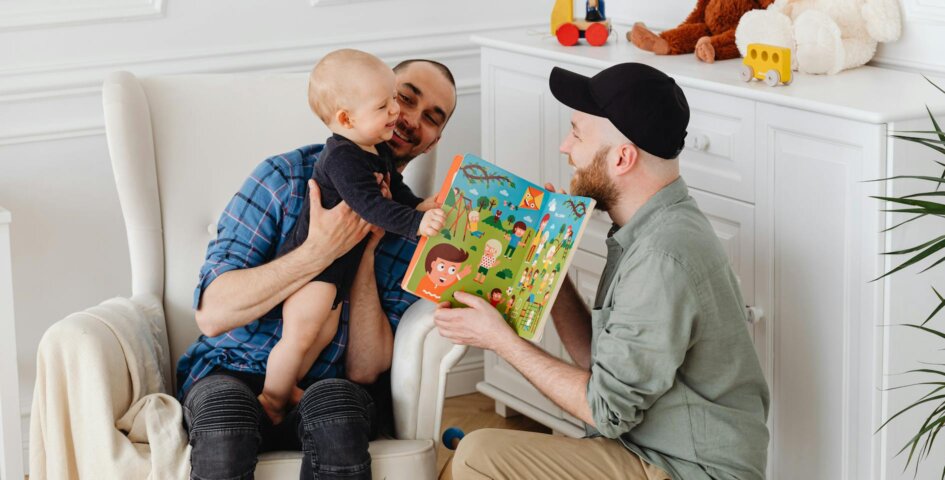In recent years, LGBTQ+ family-building options have gained significant attention, marking a positive shift towards inclusivity in family dynamics. This emerging area focuses on the unique paths LGBTQ+ individuals and couples can take to create their families. This article specifically addresses the needs and options available for LGBTQ+ individuals, shedding light on the various avenues they can explore. From surrogacy and adoption to innovative fertility treatments, the possibilities are expanding. As an illustration, many gay couples are now considering surrogacy and IVF as viable options to start their families. Similarly, adoption has opened doors for many to provide loving homes to children in need. Hence, this comprehensive exploration into LGBTQ+ family-building options reflects the evolving societal norms that celebrate diversity in family structures.
Understanding Fertility Treatments for Gay Couples
Gay couples seeking parenthood have newfound hope through advanced fertility treatments. Donor insemination, where an egg is fertilized with a donor’s sperm, stands out for its simplicity and success rates. Equally transformative is In Vitro Fertilization (IVF), a process of fertilizing an egg outside the body and implanting it in a surrogate or one of the partners. IVF notably enables at least one partner to maintain a genetic connection with the child. These options, however, bring along intricate legal and ethical considerations.
Navigating these aspects requires professional advice to safeguard the rights of everyone involved – the couple, the donor, and the surrogate. For gay couples contemplating parenthood, a thorough understanding of these fertility treatments is vital. It offers a comprehensive view of what lies ahead and aids in preparing for upcoming decisions.
Surrogacy: A Pathway to Parenthood for Gay Men
Surrogacy is a significant pathway to parenthood for gay men, offering a chance to have a biological connection with their children. The process involves a surrogate (a.k.a gestational carrier) carrying a child for the intended parents. It can be done through traditional surrogacy, where the surrogate’s egg is used, or gestational surrogacy, where the egg comes from a donor or one of the partner’s female relatives. The legal landscape of the surrogacy process varies widely across the globe, with some countries fully supportive and others having strict prohibitions. Gay couples need to understand these laws to navigate the process effectively.
Also, surrogacy involves considerable emotional investment. Prospective parents and surrogates often develop deep, complex relationships. Financially, the process can be expensive, encompassing medical costs, legal fees, and compensation for the surrogate. So, gay couples must consider these factors and plan accordingly for a smooth and fulfilling surrogacy experience.

The process of surrogacy can be quite pricy but successful and effective
Adoption: An Alternative to Biologically Related Children
Adoption is a noteworthy alternative within LGBTQ+ family-building options, allowing individuals and couples to grow their families. The adoption process for LGBTQ+ individuals, though sometimes complex, is increasingly becoming more inclusive. Prospective parents must navigate various stages, from selecting an agency to completing home studies and legal procedures. Notably, the challenges of adoption can include lengthy wait times and navigating varying state or country laws regarding LGBTQ+ adoption rights.
On the brighter side, the rewards of adoption are immense. Adoptive parents have the opportunity to provide a loving, stable home to a child in need. They also experience the unique joy of parenting, irrespective of biological ties. For assistance, numerous resources are available to prospective LGBTQ+ adoptive parents. These include specialized adoption agencies, legal advisors, and supportive community networks.

Adoption is one of the most common alternatives within LGBTQ+ family-building options
LGBTQ+ Family-Building Options
The concept of co-parenting is an innovative and forward-thinking choice in the domain of LGBTQ+ family creation. This unconventional approach involves individuals not romantically linked yet sharing the responsibilities and joys of raising children together. Such an arrangement thrives on flexibility and teamwork, making it an attractive option for many within the LGBTQ+ sphere. It is grounded in well-defined agreements covering everything from financial commitments to approaches in parenting and living setups.
Navigating the legal intricacies of co-parenting can be challenging, requiring detailed agreements to secure each person’s rights and duties. On an emotional level, this method demands open lines of communication and a shared dedication to collaborative parenting. The outcomes can be profoundly rewarding despite the inherent challenges, such as managing interpersonal relationships and legal nuances. Numerous co-parenting success stories showcase harmonious, nurturing environments for children, underscoring the value of love and mutual respect in contemporary family structures.
Financial Planning for LGBTQ+ Family-Building
Financial planning is a cornerstone of successful LGBTQ+ family-building, encompassing various costs depending on the chosen path. Whether it is surrogacy, adoption, or fertility treatments, each option carries its financial implications.
- Surrogacy can involve significant expenses like medical procedures, legal fees, and surrogate compensation.
- Fertility treatments, such as IVF, come with considerable costs.
- Adoption, though potentially less expensive, still requires funds for legal processes and agency services.
Understanding insurance coverage is critical, as it may help offset some expenses. For many, financial aid and grants can be a lifeline, providing necessary support. Therefore, consulting with financial advisors familiar with LGBTQ+ family planning is invaluable. They can offer tailored advice on budgeting, funding avenues, and long-term financial planning.

All of the options need careful budget planning
Emotional and Psychological Support Systems
For LGBTQ+ individuals, the path to family-building is often emotionally and psychologically layered, highlighting the need for robust support systems. The journey, whether it involves surrogacy, adoption, or fertility treatments, typically weaves through feelings of both excitement and anxiety. In such scenarios, it’s wise to have access to mental health professionals attuned to the unique experiences of the LGBTQ+ community.
They offer a secure environment to voice concerns, hopes, and expectations. Support groups play an equally vital role, fostering a sense of belonging by connecting individuals with peers facing similar situations. Found through LGBTQ+ centers, online platforms, and social media, these groups provide empathy, practical advice, and valuable resources. The involvement of friends and family also contributes significantly, offering a more personal layer of support.
Legal Considerations and Rights in LGBTQ+ Family-Building
Navigating the legal landscape involves understanding and overcoming various legal hurdles while ensuring one’s rights are protected. Seeking knowledgeable legal advice is essential in this process. Here’s an overview of the key legal considerations:
- Legal Hurdles and Rights: Laws regarding surrogacy, adoption, and fertility treatments can vary widely by region and country.
- Importance of Legal Advice: Professional legal counsel helps navigate complex legal systems and drafting agreements in surrogacy or co-parenting arrangements.
- Recent Legal Advancements: In recent years, there have been significant strides in legal protections for LGBTQ+ parents, including recognition of same-sex parents and non-traditional family structures.
- Remaining Challenges: Despite progress, challenges persist, such as regions with restrictive laws on LGBTQ+ rights or varying policies on parental recognition in different states or countries.
This legal landscape highlights the importance of staying informed and seeking expert guidance throughout the family-building journey.
Final Thoughts
Exploring LGBTQ+ family-building options reveals a landscape rich with possibilities. From surrogacy and fertility treatments to adoption and co-parenting, each path offers its unique set of experiences and challenges. The importance of informed decision-making cannot be overstated in this context. Each option requires careful consideration of legal, financial, and emotional aspects. Thankfully, a wealth of resources is available to guide and support LGBTQ+ individuals and couples through this process. By staying informed and accessing available support, aspiring parents can navigate these paths with confidence and optimism.
If you would like to learn more about GENESIS Fertility New York or are ready to schedule an appointment, please speak with one of our representatives at 929-605-5467.






